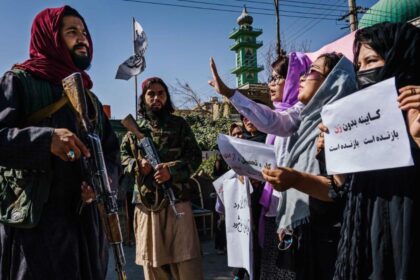RASC News Agency: In recent days, several Taliban commanders have issued warnings of a potential attack on Tajikistan. Notably, these threats primarily come from the group’s Tajik-speaking members rather than its Pashtun leadership. One of the most vocal figures is Mawlawi Amanuddin Mansoor, commander of the Taliban’s 217 Omari Corps, who hails from Badakhshan and is a native Persian speaker. A recently obtained video by RASC shows Mansoor expressing enthusiasm for an assault on Tajikistan. Addressing Taliban fighters, he declares:
“The mujahideen of Takhar, Kunduz, and Badakhshan are sufficient. If ordered, they can capture all of Tajikistan’s Badakhshan province. They are eager and awaiting the command.”
Observers believe that the Taliban’s provocative stance toward Tajikistan and their threats to its territorial integrity have led the Dushanbe government to bolster its border security and conduct military exercises along its frontiers. It appears that the Taliban’s senior leadership is deliberately instructing its Tajik members to issue public threats against Tajikistan while privately assuring Dushanbe that Afghanistani Tajik Taliban are its true adversaries implying that any support for them would be detrimental to Tajikistan’s interests. Mansoor, the Taliban commander from Badakhshan, has stated that the only deterrent preventing an attack on Tajikistan is its alliance with Moscow. However, he claims that Russia, weakened by the war in Ukraine, may no longer be capable of providing substantial support to Tajikistan.
Although Mansoor later released a video on X (formerly Twitter), asserting that his previous remarks were outdated and had been manipulated by Taliban opponents, the fervor for aggression against Tajikistan appears deeply ingrained within Taliban ranks. This is not the first instance of a Tajik Taliban commander threatening Tajikistan. Previously, another commander made similar remarks, boasting that the Tajik government would be incapable of resisting an incursion. In a video message directed at Dushanbe, he proclaimed: “To the tyrannical government of Tajikistan, and particularly its president by the grace of Allah, we are advancing day by day. We hope that soon, Allah grants us the opportunity to march into Tajikistan’s capital, Dushanbe, armed and victorious.”
He further urged Tajik citizens to join the Taliban:
“We will not allow you (the Tajik government) to continue your oppression. I call upon my dear Tajik brothers to join the ranks of the mujahideen. This jihadist caravan is moving forward.” Asadullah, a political analyst, argues that while the Pashtun-dominated Taliban leadership encourages its Tajik fighters to engage in anti-Tajikistan rhetoric, it simultaneously reassures Dushanbe that supporting Tajik Taliban factions would be against its own interests. He asserts that the Taliban’s Tajik members are mere pawns in the hands of their Pashtun commanders, exploited as a tool for political maneuvering while the leadership works to establish diplomatic relations with Tajikistan and other nations.
According to Asadullah, these persistent threats against Tajikistan underscore that the Taliban has not abandoned its extremist ideology and continues to pose a significant threat to regional stability. Notably, Pakistan has also declared that the Taliban now represent a security risk not only to its own territory but also to neighboring countries.






